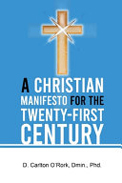
 |
A Christian Manifesto for the Twenty-First Century
by Dr. D. Carlton O’Rork, DMin., PhD.
Lettra Press
That Jesus Christ existed is an accepted fact. But was he the perfect yet entirely human manifestation of God on earth or simply a well-intentioned mortal teacher and prophet? These days, most embrace the latter view. This is partly to blame for the rise of postmodern moral relativism the world over, particularly in the United States. Such relativism has even crept into the present-day Church with its widespread acceptance of members of alternate gender identities. It has existed in American politics since 1973 when abortion was largely legalized, and, as the Christian right sees it, so was the murder of the unwanted unborn. Many people consider all truth to be subjective. For more than 2,000 years, the Nicene and Apostles' Creeds have set forth the basic beliefs of the universal Church, drawn straight from scriptural teachings. But as even the contemporary Church broadens its tolerance, traditional truth faces the danger of obsolescence.
O'Rork is a devotee, first of the teachings of Jesus Christ and then of those of theologian Francis Schaffer, who was his mentor. This book is his elaboration on Schaffer's similarly titled text from forty years ago. Formerly an enthusiastic Roman Catholic, O'Rork, now a devout Protestant and fundamentalist Christian, explains in detail the tenets of both the Nicene and Apostles' Creeds, on which Roman Catholicism is founded, in the discipline known as apologetics. He clearly explains how each aspect of both statements of faith is biblically sound or otherwise, devoting an entire chapter to the subject. He also helpfully explains the true meaning of Christian fundamentalism. Each of the book's twelve chapters ends with three thought-provoking study questions. This would make an excellent seminary textbook about Christian apologetics. Readers who disagree with him, O'Rork maintains, will at least finish it with an adequate understanding of his contentions that they dispute.